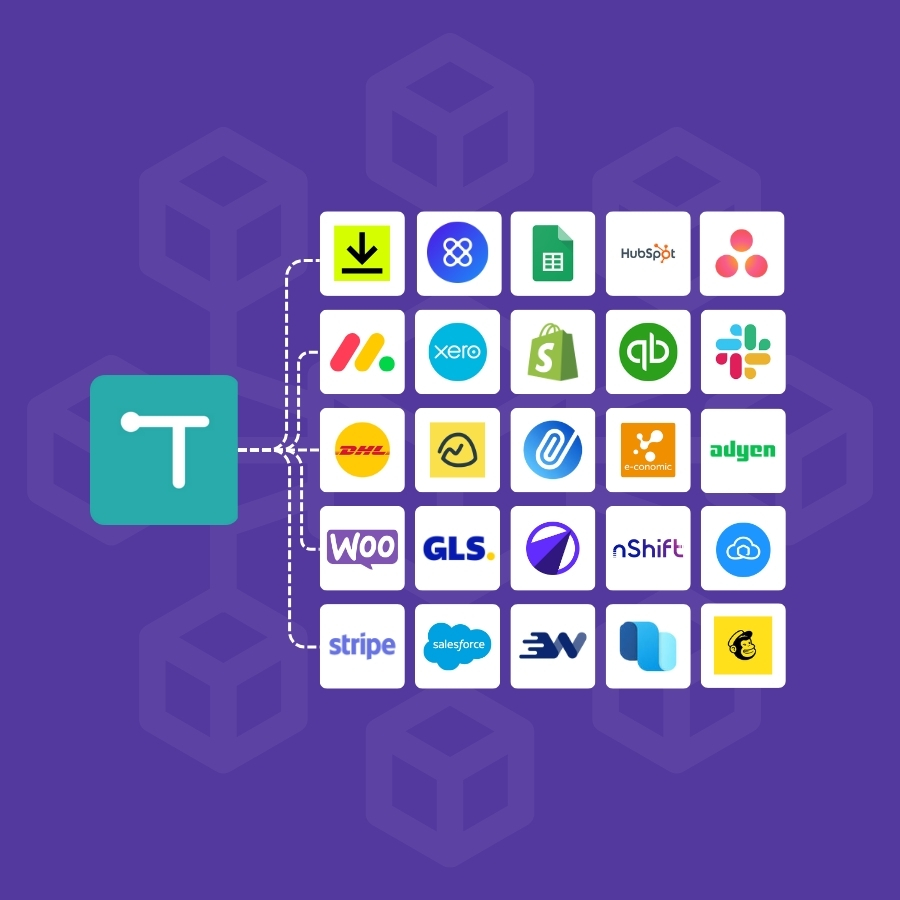ERP and Accounting System Integration in B2B eCommerce Platforms: The ROI
The complexity and cost, of ERP and Accounting Systems that function with per-seat pricing models, can be a big cost for small businesses. Learn how B2B eCommerce Integrations can streamline your B2B operations, save time and money.

In today’s fast-paced business world, enterprise resource planning (ERP) and accounting systems are vital for smooth B2B eCommerce operations. However, the complexity and cost, particularly with per-seat pricing models, can be a big no for small businesses that are just trying to make ends meet. This is where a B2B eCommerce platform like Turis becomes a game-changer, integrating and synchronizing all B2B operations related to wholesale orders.
Table of Contents
- What is an ERP and an Accounting System?
- ERP and Accounting System Integrations in B2B eCommerce
- Most Widely Used ERP Systems
- Most Widely Used Accounting Systems
- Why Are Traditional Systems Expensive?
- The Opportunity for Integration and Cost Savings
- Turis: A No-Code Solution for Growth and Efficiency
- The ROI of Investing in B2B eCommerce
- Turis: Empowering Businesses Beyond Cost Savings
What is an ERP and an Accounting System?
What is an ERP System?
ERP (Enterprise Resource Planning) systems are comprehensive software platforms that manage and integrate key business processes. These processes include supply chain management, human resources, inventory management, and more. ERPs streamline operations by consolidating data into a single system, enabling businesses to operate more efficiently and make informed decisions.
What is an Accounting System?
Accounting systems are specialized software tools focused on managing financial tasks. This includes invoicing, bookkeeping, payroll, and financial reporting. Accounting systems ensure compliance with financial regulations, provide insights into the fiscal health of a business, and simplify the process of tracking and managing financial transactions.
ERP and Accounting System Integrations in B2B eCommerce
What is a B2B eCommerce ERP Integration?
Definition: A B2B eCommerce ERP integration involves connecting your eCommerce platform with an Enterprise Resource Planning (ERP) system. This integration allows seamless data flow between your B2B eCommerce operations and back-end business processes, like inventory management, order processing, and customer relationship management.
How It Works:
- Data Synchronization: Automatically syncs data between your eCommerce platform and ERP system, ensuring real-time updates.
- Automated Processes: Streamlines processes such as order fulfillment, inventory tracking, and financial reporting.
- Unified Dashboard: Provides a single interface to manage all business operations, reducing the need to switch between systems.
Benefits:
- Enhanced Efficiency:
- Reduces manual data entry and errors.
- Speeds up order processing and fulfillment.
- Automates repetitive tasks, freeing up staff for more strategic activities.
- Real-Time Data:
- Ensures that inventory levels, pricing, and customer data are always up-to-date.
- Improves decision-making with accurate and timely information.
- Scalability:
- Easily handles increased transaction volumes as your business grows.
- Adapts to changing business needs without significant additional costs.
- Improved Customer Experience:
- Faster order processing and accurate inventory levels lead to better customer satisfaction.
- Provides customers with real-time updates on their orders.
- Cost Savings:
- Reduces the need for manual labor and associated costs.
- Minimizes errors that can lead to costly mistakes.
What is a B2B eCommerce Accounting System Integration?
Definition: A B2B eCommerce accounting system integration connects your B2B eCommerce platform with your accounting software. This integration keeps all financial transactions, such as sales, returns, and refunds, automatically recorded in your accounting system.
How It Works:
- Financial Data Sync: Automatically transfers transaction data from your B2B eCommerce platform to your accounting software.
- Automated Reconciliation: Matches sales and payment data with bank records for accurate financial reporting.
- Unified Financial View: Combines B2B eCommerce and financial data into one comprehensive view.
Benefits:
- Accurate Financial Reporting:
- Reduces manual data entry errors.
- Ensures all transactions are recorded accurately and promptly.
- Streamlined Invoicing and Payments:
- Automates the creation and sending of invoices.
- Simplifies payment tracking and reconciliation processes.
- Enhanced Cash Flow Management:
- Provides real-time insights into cash flow.
- Helps in making informed decisions about expenses and investments.
- Compliance and Audit Readiness:
- Ensures all financial transactions are well-documented and traceable.
- Simplifies compliance with financial regulations and preparation for audits.
- Cost Efficiency:
- Reduces the need for manual bookkeeping.
- Saves time and resources that can be redirected to growth initiatives.
Most Widely Used ERP Systems
- SAP ERP
- Widely used by large enterprises.
- Offers extensive modules for finance, HR, supply chain, and manufacturing.
- Oracle ERP Cloud
- Comprehensive cloud-based ERP solution.
- Known for its robust financial management and project management features.
- Microsoft Dynamics 365
- Integrates ERP and CRM functionalities.
- Flexible and scalable, suitable for businesses of all sizes.
- Infor ERP
- Industry-specific ERP solutions.
- Strong focus on manufacturing, healthcare, and distribution industries.
- NetSuite ERP
- Cloud-based ERP system by Oracle.
- Popular among mid-sized businesses for its flexibility and comprehensive suite of applications.
Most Widely Used Accounting Systems
- QuickBooks
- Widely used by small to mid-sized businesses.
- Known for its user-friendly interface and comprehensive accounting features.
- Xero
- Cloud-based accounting software.
- Popular for its ease of use and integrations with various third-party applications.
- e-Conomic
- Cloud-based accounting software.
- Provides automated financial processes and easy accessibility, enhancing efficiency and collaboration.
- Sage Intacct
- Cloud-based accounting software designed for small to medium-sized businesses.
- Offers robust financial management and reporting tools.
- FreshBooks
- Cloud-based accounting software.
- Known for its simplicity and excellent customer support, ideal for freelancers and small businesses.
- Zoho Books
- Part of the Zoho suite of business applications.
- Offers comprehensive accounting features and seamless integration with other Zoho products.
See all our Integrations and Connectors

Why Are Traditional Systems Expensive?
Per-Seat Pricing Model: Many ERP and accounting systems use a per-seat pricing model, charging based on the number of users. This can be expensive, as even small businesses may need multiple seats for occasional tasks.
Impact on Employee Satisfaction: The complexity and user-unfriendly nature of these systems can impact employee satisfaction, leading to frustration and decreased productivity.
The Opportunity for Integration and Cost Savings
Integration Capabilities: ERPs and accounting systems typically offer robust interfaces for integration. When combined with a B2B eCommerce platform, these integrations can significantly streamline business processes and operations.
Reducing the Need for Multiple Seats: The integration with a B2B eCommerce platform automates tasks such as order creation, stock synchronization, and invoice management. This reduces at a large scale the need for multiple employees to access the ERP or accounting system, saving costs on additional user seats.
Turis: A No-Code Solution for Growth and Efficiency
Seamless Integration with ERPs and Accounting Systems: Turis provides standard integrations and connectors that allow seamless syncing with various ERPs and accounting systems. This ensures that sales orders and stock values are automatically updated, reducing the need for manual input.
No-Code Platform: Turis’s no-code platform is user-friendly, requiring no technical expertise. This ease of use extends to setting up and managing integrations. Integrations are usually very straightforward and one click away. Making the process straightforward and hassle-free.
How to Kick-Start a B2B eCommerce Business in 7 Easy Steps: Guide 2024

The ROI of Investing in B2B eCommerce
Immediate Cost Savings: Reducing the number of required seats for ERP and accounting systems can lead to immediate cost savings. These savings can be redirected towards investments in platforms like Turis, which offer direct growth opportunities.
Enhancing Business Growth: A B2B eCommerce platform like Turis not only reduces operational costs but also opens avenues for business growth. It streamlines the sales process, improves customer experience, and provides data insights for strategic decision-making.
Turis: Empowering Businesses Beyond Cost Savings
Improving Employee Experience: By reducing reliance on complex ERPs and accounting systems for everyday tasks, Turis enhances employee satisfaction. A more intuitive and user-friendly platform means less time spent on cumbersome systems and more on productive tasks.
Customization and Flexibility: Turis offers a high degree of customization and flexibility, allowing B2B companies to tailor the eCommerce solution to their specific needs and workflows.
Accessible for All Users: In a business environment where cost efficiency and growth are paramount, Turis offers a compelling solution. It integrates seamlessly with ERP and accounting systems, facilitating cost savings and enhancing overall business functionality and employee satisfaction. The platform’s no-code approach makes it accessible for all users, while its customization capabilities ensure it adapts to each business’s unique needs.
In essence, Turis is not just a tool for managing B2B transactions but a strategic partner in driving business efficiency and growth. By reallocating resources from static systems to dynamic, growth-oriented platforms, Turis positions businesses for success in the competitive B2B landscape.

